Participants from more than 20 countries shared plenaries, projects, resources and worked in groups. The meeting was organised by the Lausanne Movement and the WEA.
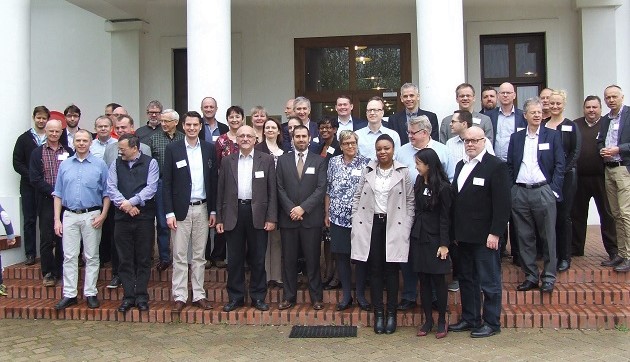 The Europe-Eurasia Workplace Forum participants. / Europe-Eurasia Workplace Forum.
The Europe-Eurasia Workplace Forum participants. / Europe-Eurasia Workplace Forum.
The Europe-Eurasia Workplace Forum took place in Budapest from April 8th to April 10th, co-organised by the Lausanne Movement and the World Evangelical Alliance.
The participants came from more than 20 different countries, representing different backgrounds and sectors, like business, academics, government or church.
Jerry White was in charge of the welcoming and introduction of the Forum. He emphasised the aim of creating a place to share ideas, initiatives, and resources, in order to bring the gospel to the workplace, to bless the nations.
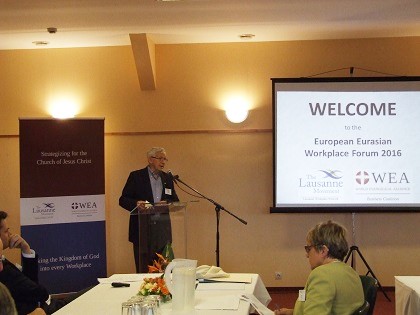 Jerry White introduces the Conference.
Jerry White introduces the Conference. It is an opportunity to learn about others strategies, give biblical answers to situations that are happening in the workplace, and to propose solutions. The collaboration and support between organisations, and having the chance to know what other countries are doing, are some of the most important parts of the conference.
The program was organised in 3 parts: plenaries, projects and initiatives, and working groups geographically organised.
FRIDAY PLENARIES
The main topics and challenges faced by Europe, the world work, and the church were tackled, focusing on how to respond to them from a Christian worldview.
On Friday, Timo Plutschinski (Germany) emphasised the necessity of bringing the new message of the gospel to the workplace, as well as its essential values, like honour, truth and justice. These are far from the image that some want to give about the Bible as something old, out-of-style and even oppressive.
Arleen Westerhof (Netherlands), shared the urgency of responding to 4 big problems: unemployment, the growing inequality, the political weakness, and the decline of the Christian faith, while other forms of spirituality are raising.
Berit Kloster (Norway) talked about the strategies that his church has use for evangelism and mission, pointing out that the great commission has not finished.
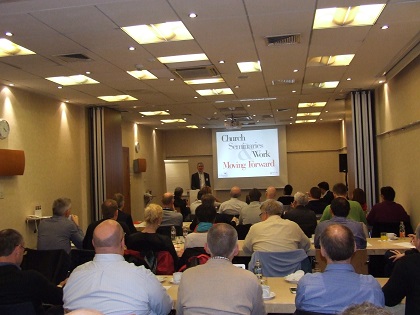 There were seminaries about Bible and the workplace.
There were seminaries about Bible and the workplace.
Dr Jany Haddad´s talk, representing the Middle East, was about the future of Christianity in Syria. It impressed to see how the gospel is bringing hope in the middst of all the destruction caused by the war.
SATURDAY PLENARIES
Saturday started with Monika Meltzerva (Slovenia), who focused on the negative impacts the new information and communication technology is having on human relationships (loneliness, isolation, excessive pressure). She also pointed our the importance of developing a female leadership.
Tiago Aragao (Portugal) shared his own experience as a lawyer and a member of the Portuguese Evangelical Alliance.
Anne-Marie Husson (France) showed the main results of a big survey made in France, about the most important purpose of people's work life, and how that affects the way the understand and live the Christian faith.
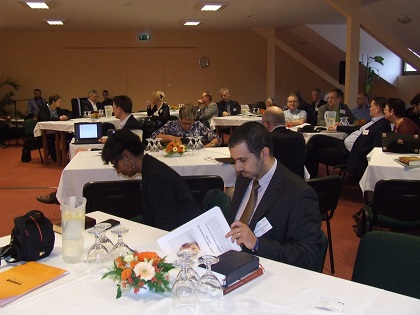 Working in groups.
Working in groups.
Steinar Opheim (Norway) insisted on the importance of human relationships in a very isolated world. The first reason why people come to Christ is because of a relationship.
Willy Kotiuga (Canada), made a “tour” around the prophets, pointing out that if we want a government with good principles, we should learn from them (Abdias, restructuring; Joel, transparency, etc...)
Mark Greene (UK) was the last speaker, and he emphasised that if a a country wants to see the work place as a mission field, it is crucial that the local church takes part on that. In order to achieve that goal, two mistakes need to be solved: one is theological (separation between sacred and secular); the other is methodological (making real disciples, and not just keeping people to have participants for church activities).
INITIATIVES AND PROJECTS
The European Economic Summit will take place on September 7th -9th , with the motto: “Business and Economics Promoting Justice, Integrity and Human Flourishing.”
Tent International: The tentmaking movement is formed by students, professionals and business people, who study and work cross-culturally and at the same time share the good news about Jesus with others.
From Holland, Encour shared a project that can be used in society and church, to help unemployed people.
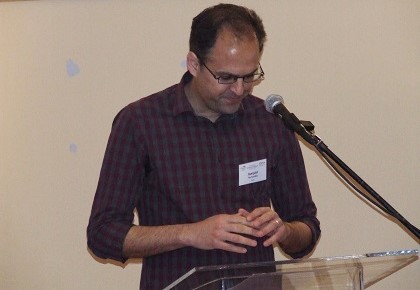 Joaquín Hernández, from Spain, during a devotional.
Joaquín Hernández, from Spain, during a devotional. Spain presented the work they are doing with graduates and professionals, in four main areas: the development of professional groups (there are groups of Business and Economy, Medicine, Nurses, Law, Communication, Psychology, Teaching, and Science); the webpage porfineslunes.org, a place to think about the workplace; the gatherings they have, and the books series Excellence and work.
DEVOTIONAL TIME, COMUNION AND CULTURE
Every day started with a worship and prayer time. The devotionals were guided by Joaquín Hernández (Spain) and Vilver Oras (Estonia), connecting the Word of God with the main topics of the conference.
There was also time for a cultural visit to Budapest, to enjoy the beauty and architecture of the city.
REGIONAL WORK AND MANILA 2017
Under the direction of Jean-Paul Rempp (France), the assistants were organised in three big areas: Southern Europe, Northern Europe, and Center and Eastern Europe.
On Sunday, each group identified the main social and ideological problems each region faces, and tried to find solutions to them.
The conclusions will be very useful for the work that each country is doing, and they will also shape the next world conference, which will take place in Manila, in 2017.

Las opiniones vertidas por nuestros colaboradores se realizan a nivel personal, pudiendo coincidir o no con la postura de la dirección de Protestante Digital.
Si quieres comentar o